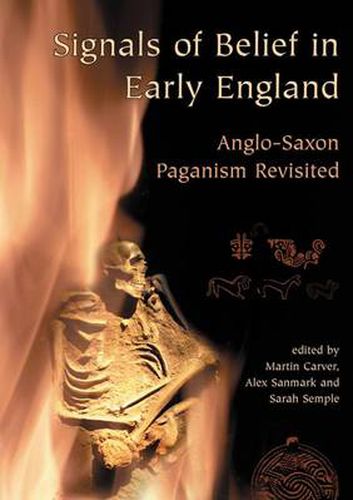Readings Newsletter
Become a Readings Member to make your shopping experience even easier.
Sign in or sign up for free!
You’re not far away from qualifying for FREE standard shipping within Australia
You’ve qualified for FREE standard shipping within Australia
The cart is loading…






This volume will throw new light on the intellect of the earliest English - the way they thought, the way they viewed the world, and the way they viewed worlds other than this. Previous understanding of the topic, well rooted in the ideas of its time, regarded the English as adherents of two consecutive religions: Paganism governed the settlers of the 4th-6th century, but was superseded in the 7th-10th century by Christianity. Of the two, Christianity, a religion of the book, documented itself thoroughly, while in failing to do so Paganism laid itself open to centuries of abuse, conjecture or mindless admiration.
In developing new objectives, the papers here demonstrate that beliefs varied from place to place and were expressed in material culture. Through archaeology therefore, these beliefs can be rediscovered. Aware of the fact that even the best archaeology provides no open access to the mind, the contributors record, and study, signals of belief rather than what was believed.
The premise of this volume is therefore that paganism was not a religion with supraregional rules and institutions but a loose term for a variety of local intellectual world views. The same courtesy is extended to Christianity. Both religions are treated as sources on which people, local people - the true agents of Anglo-Saxon England - eclectically drew.
A range of material culture and locations across Northern Europe are explored, looking at signals of belief from the landscape, water cults, burial rites, the hall and animals in life and art. Each author looks across the sea to Scandinavia, as well as to the woods and fields, mires and mounds of Old England, resulting in a new perspective on the intellectual preoccupations and anxieties of a crucial age.
$9.00 standard shipping within Australia
FREE standard shipping within Australia for orders over $100.00
Express & International shipping calculated at checkout
This volume will throw new light on the intellect of the earliest English - the way they thought, the way they viewed the world, and the way they viewed worlds other than this. Previous understanding of the topic, well rooted in the ideas of its time, regarded the English as adherents of two consecutive religions: Paganism governed the settlers of the 4th-6th century, but was superseded in the 7th-10th century by Christianity. Of the two, Christianity, a religion of the book, documented itself thoroughly, while in failing to do so Paganism laid itself open to centuries of abuse, conjecture or mindless admiration.
In developing new objectives, the papers here demonstrate that beliefs varied from place to place and were expressed in material culture. Through archaeology therefore, these beliefs can be rediscovered. Aware of the fact that even the best archaeology provides no open access to the mind, the contributors record, and study, signals of belief rather than what was believed.
The premise of this volume is therefore that paganism was not a religion with supraregional rules and institutions but a loose term for a variety of local intellectual world views. The same courtesy is extended to Christianity. Both religions are treated as sources on which people, local people - the true agents of Anglo-Saxon England - eclectically drew.
A range of material culture and locations across Northern Europe are explored, looking at signals of belief from the landscape, water cults, burial rites, the hall and animals in life and art. Each author looks across the sea to Scandinavia, as well as to the woods and fields, mires and mounds of Old England, resulting in a new perspective on the intellectual preoccupations and anxieties of a crucial age.